50 years on – the day an earthquake shook the rugby world
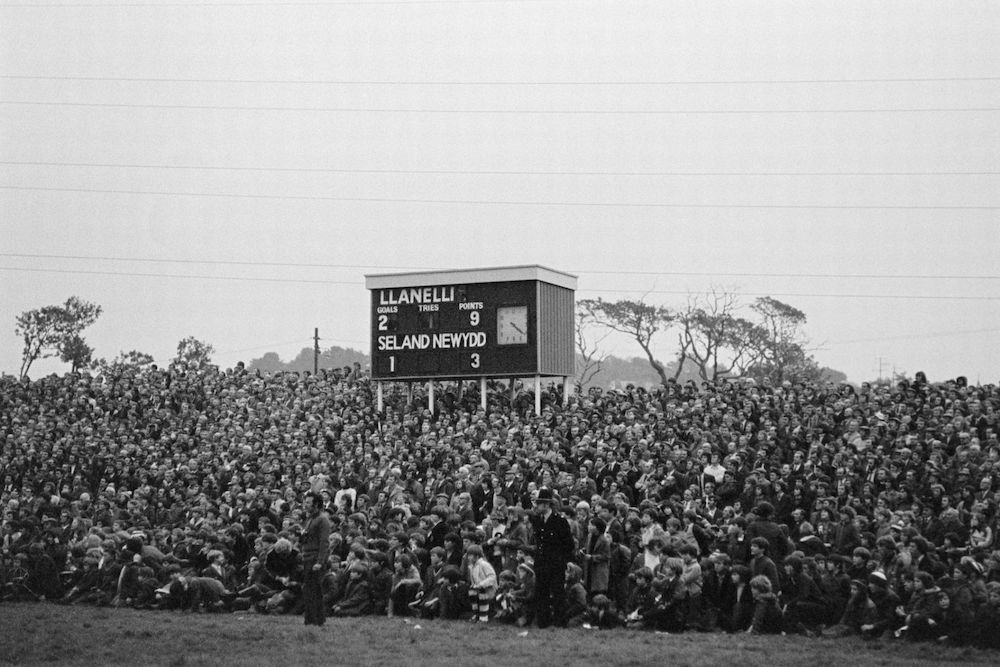
Simon Thomas
It remains one of the most evocative images in the history of Welsh rugby – the picture of the Stradey Park scoreboard reading: ‘Llanelli 9, Seland Newydd 3’.
That was the historic result on a dank, dark afternoon on October 31, 1972 when a team coached by Carwyn James and captained by Delme Thomas defeated the All Blacks.
In front of more than 20,000 impassioned spectators, an early try from centre Roy Bergiers and successful kicks from Phil Bennett and Andy Hill saw the Scarlets through to the most famous of victories.
What happened after the game was just as legendary, with the pubs of Llanelli being drunk dry. On its 50th anniversary, here is the story of that day.
TOMMY’S TALE
Back row forward Tommy David was just a couple of months into his Llanelli career when the game against the All Blacks came around.
Half a century on, he explains how that fixture was a key reason behind him moving to the club from Pontypridd.
“I was very happy in Ponty, all my friends and family were there,” he says.
“But when Carwyn (James) rang me and asked me to join Llanelli, his first words were ‘The one thing is Tom, Pontypridd will never play New Zealand, we are playing them in October’.
“He said ‘You come here, hold your form and you will be in the side’.”
James was true to his word, with the then 24-year-old David being selected to start on the blindside flank against the touring Kiwis.
“When my name came out, I felt like jumping through the ceiling. To play New Zealand is very, very special.”
Then came coach Carwyn’s final instructions to his players before the game, words David recalls vividly to this day.
“He said ‘Right, you have had a couple of weeks of fantastic training. I could not have asked for anything better. But remember one thing, I am only here to organise you guys, it’s your decisions that will make the difference’. He was brilliant in that way. Carwyn was a deep man, a real thinker on the game.”
With skipper Delme Thomas having given an inspirational pre-match speech – more of which later – the Scarlets were ready to go.
“The atmosphere in the dressing room was electric, there’s no doubt about that,” said David.
“It was a sell-out crowd and you didn’t want to let your family or your friends down.”
Scrum-half Ray “Chico” Hopkins once described the scene that greeted the players when they ran out as “black, dark clouds, cold and windy, like going to a funeral not to a game. It was real Welsh hywl”.
As for David’s recollections, he says: “When we came out of the tunnel, the atmosphere was incredible. It was unique.”
Then came the Haka.
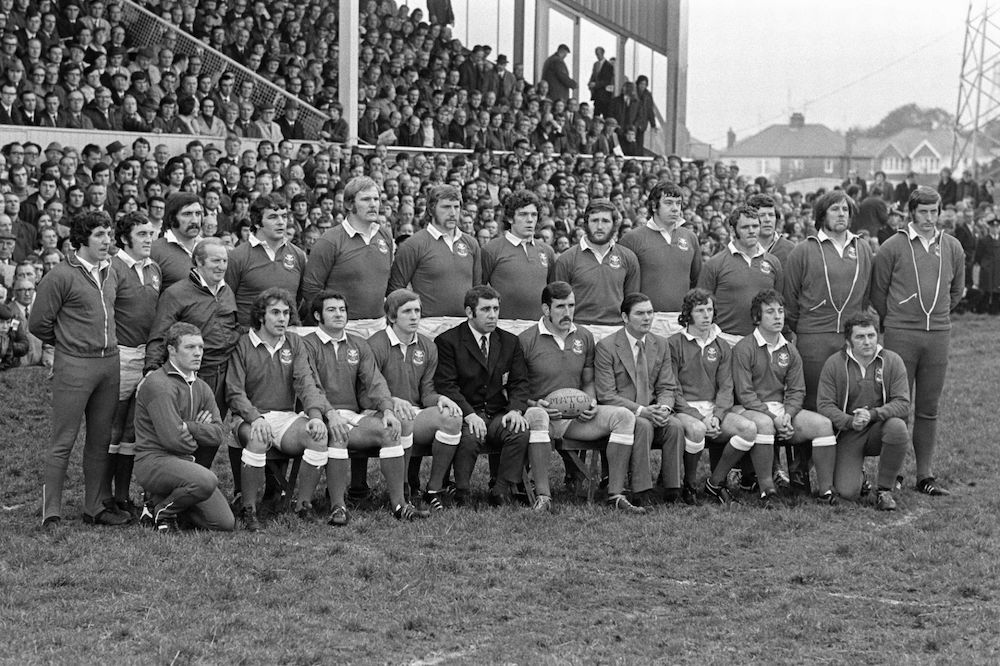
“When you face the Haka for the first time, it’s very strange. They are there doing all the motions, with all the body language, and they just stare at you. That’s all I did was stare back at two players – Murdoch and Whiting – almost to say ‘I can’t wait to bloody see you on the field’”.
That attitude was to sum up Llanelli’s approach as they went toe to toe with the tourists.
“We knew the score after about two or three minutes that we were going to have to be very physical,” said David.
“Carwyn had mentioned this in training sessions. He said this is the way they play, you have got to meet them head on.
“People will never understand how physical that game was. In the last 20 minutes, they came at us strong, but we tackled our guts out.
“It was definitely in the balance, but we held our own and we took them on physically. We realised we had to be there together going into rucks and mauls. Right to the last whistle, we were fighting like hell for the ball, trust me.”
He added: “We definitely weren’t the favourites to win because it was New Zealand. But we had a wonderful side with a lot of quality and a lot of international experience.
“When you look at the back line, we had so many talented players and then hard boys up front. The effort that went into it was 101 per cent, especially the physical side in the tackles, the rucks, the mauls, the scrums, everything. The effort all the players put in that day was very special.”
On the legacy of that 9-3 victory, David says: “It took time for it to sink in. But as the years pass, you go deeper and deeper into it. You realise all the effort that went into it and how fantastic it was.”
This 50th anniversary year has, of course, been tinged with sadness, following the death in June of Phil Bennett, the little maestro who played such a key role in the triumph with his tactical mastery at fly-half.
“I was down there at his funeral and that was a very tough day,” said David.
“Phil was such a talented player and he would always encourage you. Whenever the ball went over your head and Benny had it, you knew it was 101 per cent safe. He was a great player and a great man.”
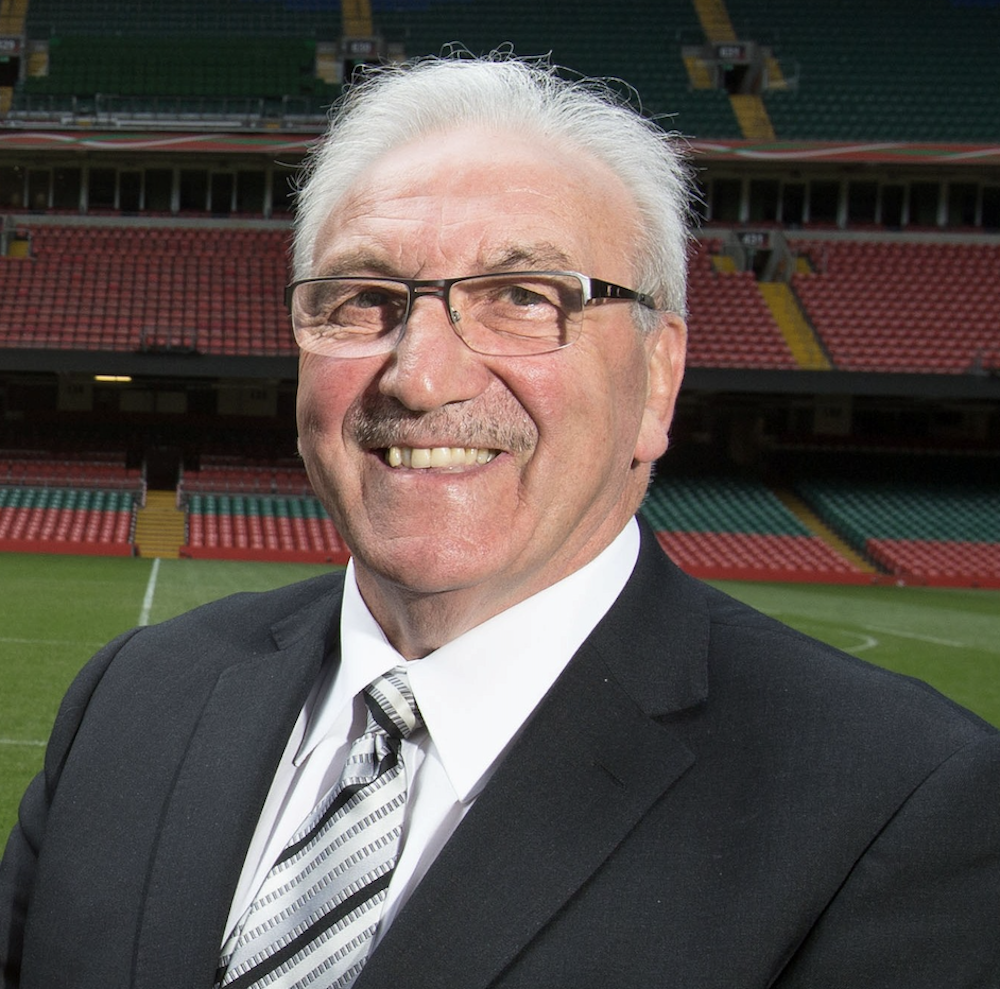
THE TRY SCORER
It was just two minutes into the game when Roy Bergiers’ life changed forever.
As Phil Bennett’s penalty bounced back off the cross bar, the ball was collected by Kiwi scrum-half Lin Colling who went to take play downfield. But his attempted clearing kick was blocked by centre Bergiers who pounced to score.
“I charged it down, the ball happened to be there and I fell on it.” Such is the wonderfully modest and matter-of-fact way he describes that momentous moment.
But then he has second thoughts. “Hang on, no, no. Fifty years on, didn’t I run 25 yards and beat three men?”
As well as his try, what Bergiers will always remember from that day is the pre-match speech given by captain Delme Thomas at the Ashburnham Hotel a couple of hours before kick-off.
“I never used to eat before a game, perhaps just a bit of toast with honey on it for energy and grapes and that sort of thing,” he explains.
“But, on this occasion, they put fillet steaks in front of us. Delme started talking and I was looking at this steak thinking ‘I shouldn’t eat that’.
“But as he was talking, I was getting wound up and I took two quick slices and shoved it down!
“I almost choked on it because Delme was talking about what our families had given up for us, wives, mothers, fathers. So he really hit the heart.
“He talked about how much the game meant to all the supporters and then when he said he would give up his three Lions tours and his 25 Wales caps to beat the All Blacks that day, well we would have followed him to the end of the earth. You knew it was from his heart and what he said he meant.
“He was a man mountain. Even now, whatever Delme says, you’ve got to listen to. He is revered the world over.”
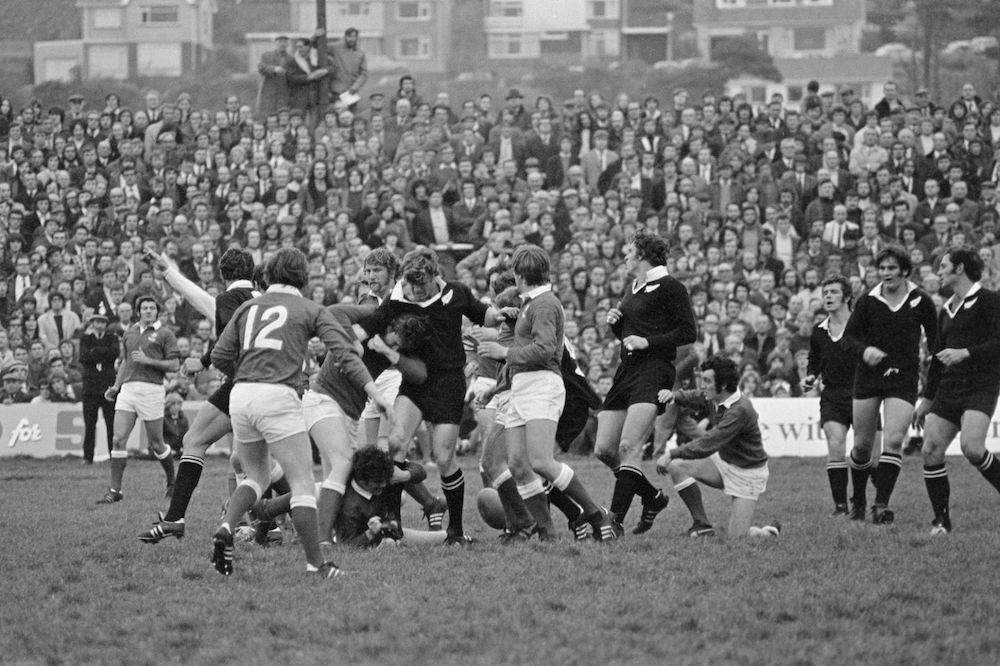
Bergiers was only 21 back in 1972 and had just started his first teaching job in his home-town of Carmarthen, at Ystrad Tywi Secondary Modern.
“It had been arranged for all the schoolboys from the area to sit at the scoreboard end of the ground on planks of wood supported by pop bottle crates,” he recalls.
“A lot of the boys there were pupils from my school, where I had been teaching for about six weeks, so to score in front of them was very special.
“I’ve got a photo of me scoring the try, where you can just see me getting up. But what fascinates me is the pupils behind. I can still recognise a few of the faces now.
“Isn’t it wonderful that you can share an occasion like that with pupils and people that you knew? It was a special moment.
“It all happened so quickly at the time. Running back, it was a sense of disbelief. I was thinking ‘What do I do, what is the protocol? Do I jump in the air, do I grab people, what do I do?’”
FOLKLORE!
His try has been replayed so often over the years and will be doubtless be re-run again to mark the 50th anniversary.
“As time goes by, you think ‘Was that really me?’ It’s a very nice memory, one of the greatest moments of my life.
“To achieve what we did, in front of your home crowd, was absolutely wonderful. It was a lovely feeling and an incredible occasion.”
Now, half a century on, Bergiers finds that amazing day in his life firmly back in the spotlight.
“Furnace Primary School have been doing a special project on the 9-3 game,” he said.
“The pupils have written poems and songs. They have made Groggs out of papier mache. Derek Quinnell’s grandson attends the school, so that’s a nice connection.
“I was invited to go down there by one of the teachers and I said I would be pleased to come along and that I’d have a surprise for her.
“What she didn’t know was I was going to ask Delme to come with me.
“When we walked in and she saw Delme Thomas, well, she was blown away. They had a lovely surprise from that, Delme the captain.
“We spent the whole morning there. The pupils sang their songs for us and rehearsed a little play they are putting on about the game next month. It was absolutely lovely.
“Fifty years on and we are a history project! It’s become folklore.”
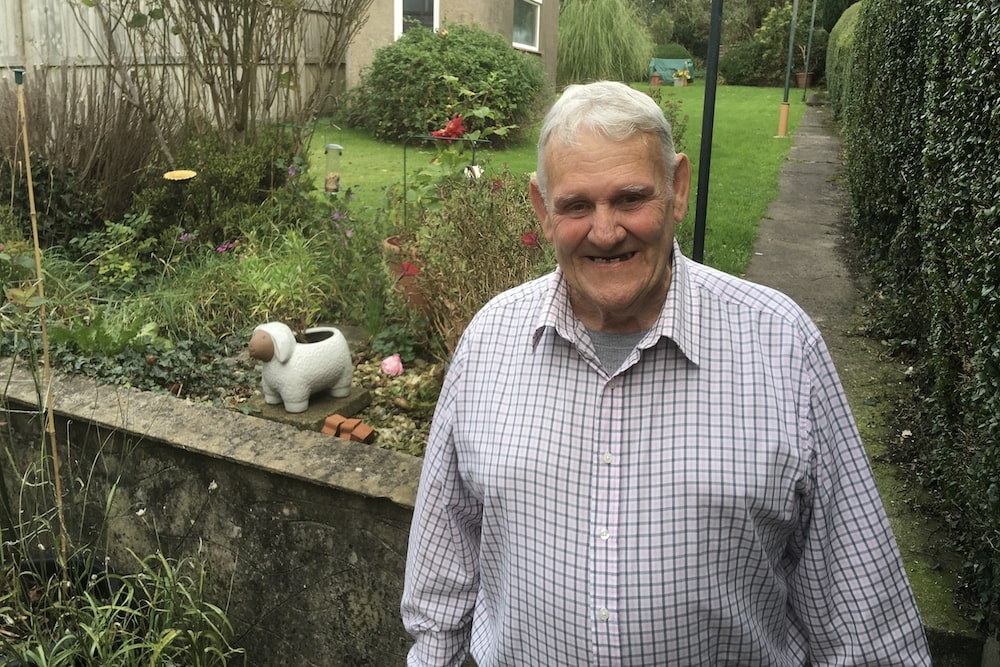
MURDOCH MAYHEM
It was a no-holds encounter and one which slipped over into violence on a fair few occasions. A number of those incidents involved notorious All Blacks prop Keith Murdoch.
The loosehead stamped on the head of hooker Roy ‘Shunto’ Thomas, put the boot in on a prone Ray Gravell, laid out flanker Gareth Jenkins and kicked Barry Llewellyn so hard up the backside that the Llanelli prop was left with blood on his shorts in the dressing room.
Commentating on the match at the time, the great David Parry-Jones described Murdoch as “a disagreeable fellow”, which was putting it mildly!
Speaking on a BBC documentary, Jenkins – who, of course, went on to coach the Scarlets and Wales – recalled his own treatment at the hands of the Otago prop.
“He whacked me out cold, just knocked me out. He was a tough man, a seriously tough man,” he said.
Tommy David uses rather more colourful language.
“Murdoch was a real dirty b*****d. If your head was there, it would soon have zips! He really went in nasty with the boot in the rucks. If you were down on the floor, you were going to get a stamping off him.”
Murdoch’s tour was infamously cut short a few days later when he was sent home after an incident at the Angel Hotel following his try-scoring contribution to New Zealand’s 19-16 victory over Wales in Cardiff. Legend has it his response was to fly to Australia and head into the Outback, quitting rugby forever.
THE AFTERMATH
When English referee Mike Titcomb blew the final whistle at Stradey Park on the late afternoon of October 31, it signalled scenes of wild jubilation amid a mass pitch invasion.
Try-scorer Bergiers recalls: “With all the people running on, it was just euphoric. Coming off, two of my friends went to put me on their shoulders. One was 6ft 4ins and the other was about 5ft 6ins, so it was a bit uneven.
“I went up, I stayed there for a couple of seconds and the next thing I tilted over and ended up with my head down towards the floor and my feet in the air!”
Skipper Delme Thomas was chaired from the field by Barry Llewellyn and Derek Quinnell, but getting to the dressing room was easier said than done.
“It must have taken us 20 minutes to get off the field,” former second row Thomas told the BBC’s ‘We Beat the All Blacks’ documentary.
“Everybody was part of the game, not just the players, the spectators. It was a great joy for them and you felt for them. They had followed Llanelli year after year after year. It was something for them as well. It was a great honour for the town.”
Summing up the scene, Gareth Jenkins said: “It was just euphoria, just chaos and mayhem and then that was the start of it.”
It was indeed, with the celebrations going on long into the night. The final words go to Tommy David.
“Max Boyce came out with the song saying how the pubs ran dry. Well, I was in that team! I did my bit.
“We were in the clubhouse and then in the town and all the supporters were there and all they wanted to do was buy you a drink. I was quite happy with that, trust me! We all had a good drink.
“The celebrations, for the team, the supporters and the whole town was magnificent. It was brilliant, just absolutely incredible.
“It’s a day and a night I will never forget, ever.”
THE TEAMS
Llanelli: Roger Davies; JJ Williams, Roy Bergiers, Ray Gravell, Andy Hill; Phil Bennett, Ray ‘Chico’ Hopkins; Tony Crocker, Roy Thomas, Barry Llewellyn, Delme Thomas (capt), Derek Quinnell, Tom David, Hefin Jenkins, Gareth Jenkins.
Replacements: Selwyn Williams, Alan James, Chris Charles, Brian Llewellyn, Gwyn Ashby, Meirion Davies.
New Zealand: Joe Karam; Bryan Williams, Bruce Robertson, Mark Sayers, Duncan Hales; Bob Burgess, Lindsey Colling; Keith Murdoch, Ron Urlich, Graham Whiting, Andy Haden, Pole Whiting, Alistair Scown, Alan Sutherland, Ian Kirkpatrick (capt).
Replacement: Grant Batty.
* The pictures of the game accompanying this article are taken from the book “9-3: 31/10/72 – the day the pubs ran dry”, a collection of photographs by Alan T Richards. The book costs £15 plus postage and packaging and is available direct from Andrew Richards. You can contact him via his Twitter account @Essex_Welsh_Ref, while the book is also on sale at Shop Ty Tawe Bookshop, in Swansea, and Siop Y Pentan in Llanelli.
Support our Nation today
For the price of a cup of coffee a month you can help us create an independent, not-for-profit, national news service for the people of Wales, by the people of Wales.






Cardiff have beaten the All Blacks,
Swansea have beaten the All Blacks,
and Newport probably had the most impressive victory of all inflicting the only defeat of the 36 game tour on the 1963 side.
So what is so special about Llanelli beating the midweek team of a side that managed to lose 5 games out of 32 on the 72/73 tour?
The LAST time a Welsh club side beat the all blacks. Cardiff and Swansea did it in 1953, 71 years ago. And I’m sure there were special circumstances THEN which put the ABs off their game too. Like, oh I dunno, travelling to the other side of the world when mass transport wasn’t so quick or so comfortable as it was in the 70s. If Cardiff and Swansea are so brilliant, how come they haven’t beaten the ABs in the 71 years since? It should not be a badge of pride that our grandparents once beat the ABs back in… Read more »